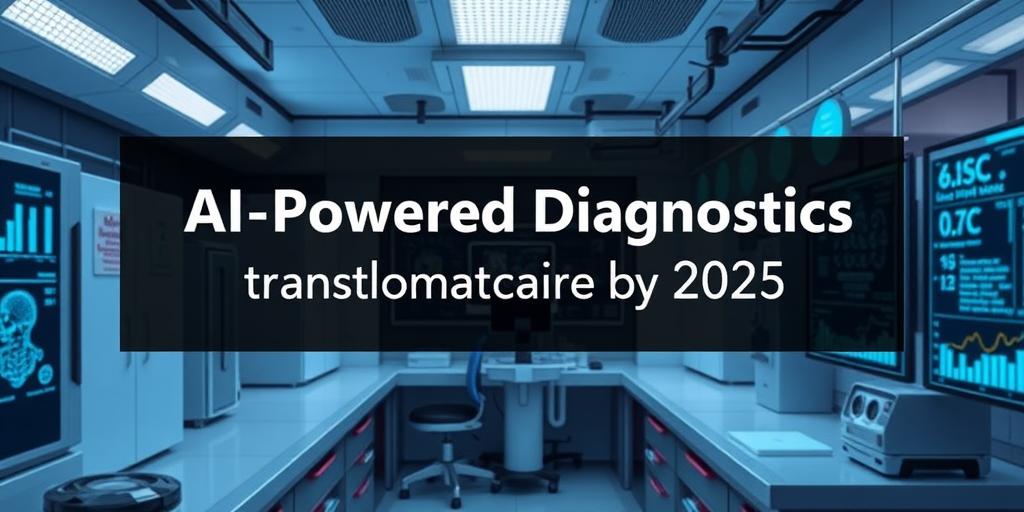AI-Powered Diagnostics: Transforming Healthcare by 2025 (India & World)
The integration of Artificial Intelligence (AI) into healthcare diagnostics is rapidly accelerating, promising a paradigm shift in how diseases are detected, monitored, and treated. By 2025, AI is poised to revolutionize diagnostic processes worldwide, with significant implications for both developed and developing nations like India. This article explores the transformative potential of AI in diagnostics, focusing on its impact, challenges, and future prospects.
Current State of AI in Healthcare Diagnostics
AI’s role in healthcare is expanding beyond simple data analysis. Machine learning algorithms can now analyze complex medical images, predict patient outcomes, and assist in personalized treatment plans. In diagnostics, AI algorithms are being used to:
- Enhance Image Analysis: AI algorithms can detect subtle anomalies in medical images (X-rays, CT scans, MRIs) that might be missed by human observers. This leads to earlier and more accurate diagnoses.
- Accelerate Diagnosis: AI can significantly reduce the time required for diagnosis. Automated analysis of lab results and medical images can provide quick insights, especially crucial in emergency situations.
- Improve Accuracy: AI algorithms reduce human error and subjective interpretations, leading to more consistent and reliable diagnostic outcomes.
- Personalize Treatment: By analyzing patient data, AI can predict individual responses to treatments, enabling more tailored and effective healthcare strategies.
Impact in India by 2025
India, with its vast population and diverse healthcare challenges, stands to gain significantly from AI-powered diagnostics. Key impacts expected by 2025 include:
- Improved Access to Healthcare: AI can extend diagnostic services to remote and underserved areas through telemedicine and mobile health units. AI-powered diagnostic tools can be deployed in regions where access to specialized medical professionals is limited.
- Reduced Healthcare Costs: AI-driven automation can reduce the costs associated with manual diagnostic processes, making healthcare more affordable for a larger segment of the population.
- Better Management of Diseases: AI can play a crucial role in managing prevalent diseases in India, such as tuberculosis, diabetes, and cardiovascular diseases. Early and accurate diagnosis facilitated by AI can improve treatment outcomes and reduce the burden on the healthcare system.
- Enhanced Public Health Surveillance: AI algorithms can analyze real-time data to detect disease outbreaks and trends, enabling quicker and more effective public health interventions.
Global Transformations
Globally, AI is set to bring about similar transformative changes in healthcare diagnostics. Key areas of impact include:
- Precision Medicine: AI enables the development of personalized treatments based on individual genetic and lifestyle factors. Diagnostic tests informed by AI can identify specific biomarkers and predict drug responses with greater accuracy.
- Early Disease Detection: AI algorithms can analyze large datasets to identify patterns and predict the onset of diseases years before symptoms appear. This offers opportunities for early intervention and preventive care.
- Drug Discovery and Development: AI accelerates the drug discovery process by analyzing vast amounts of data to identify potential drug candidates and predict their efficacy. This reduces the time and cost associated with bringing new drugs to market.
- Remote Patient Monitoring: AI-powered wearable devices and remote monitoring systems enable continuous monitoring of patients’ health status, allowing for timely intervention and prevention of complications.
Challenges and Considerations
Despite the immense potential, several challenges must be addressed to ensure the successful integration of AI in healthcare diagnostics:
- Data Privacy and Security: Protecting patient data is paramount. Robust data governance frameworks and cybersecurity measures are essential to prevent data breaches and ensure compliance with regulations like GDPR and HIPAA.
- Regulatory Frameworks: Clear regulatory guidelines are needed to govern the development, validation, and deployment of AI-based diagnostic tools. These guidelines should address issues such as accuracy, reliability, and accountability.
- Ethical Considerations: Ethical frameworks are necessary to address issues such as bias in algorithms, transparency, and the potential displacement of healthcare professionals. AI systems should be designed to augment, not replace, human expertise.
- Infrastructure and Resources: Adequate infrastructure, including high-speed internet, computing power, and skilled personnel, is necessary to support the deployment and maintenance of AI-based diagnostic tools, particularly in resource-constrained settings.
Future Prospects
Looking ahead, the future of AI in healthcare diagnostics is bright. Continuous advancements in AI technology, coupled with increasing investment in healthcare infrastructure and research, will drive further innovation. Key trends to watch include:
- Integration with IoT Devices: The integration of AI with Internet of Things (IoT) devices will enable real-time monitoring of patient health, leading to more proactive and personalized care.
- AI-Powered Virtual Assistants: AI-powered virtual assistants will provide patients with personalized health advice, answer questions, and guide them through the healthcare system.
- Advancements in Natural Language Processing (NLP): NLP will enable AI systems to understand and interpret medical records, clinical notes, and patient communications, leading to more efficient and accurate diagnoses.
- Collaboration Between AI and Human Experts: The most effective diagnostic solutions will leverage the strengths of both AI and human experts. AI can handle routine tasks and analyze large datasets, while human experts can provide nuanced insights and make complex clinical judgments.
Conclusion
AI-powered diagnostics is poised to transform healthcare by 2025, offering unprecedented opportunities to improve patient outcomes, reduce healthcare costs, and enhance access to medical services. While challenges remain, addressing them proactively will pave the way for a future where AI and human expertise work together to deliver more effective, efficient, and equitable healthcare for all.
